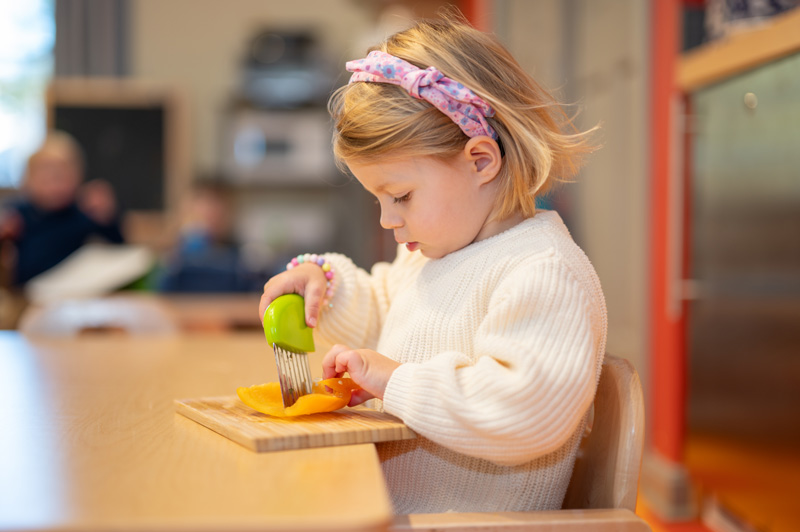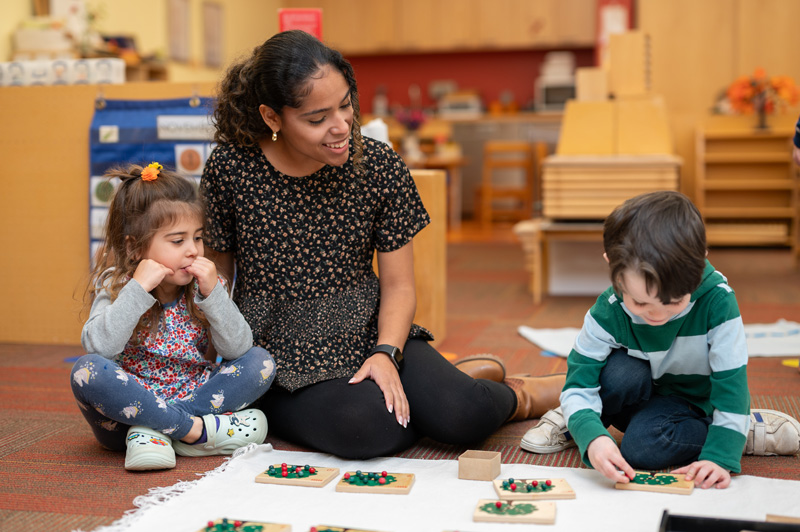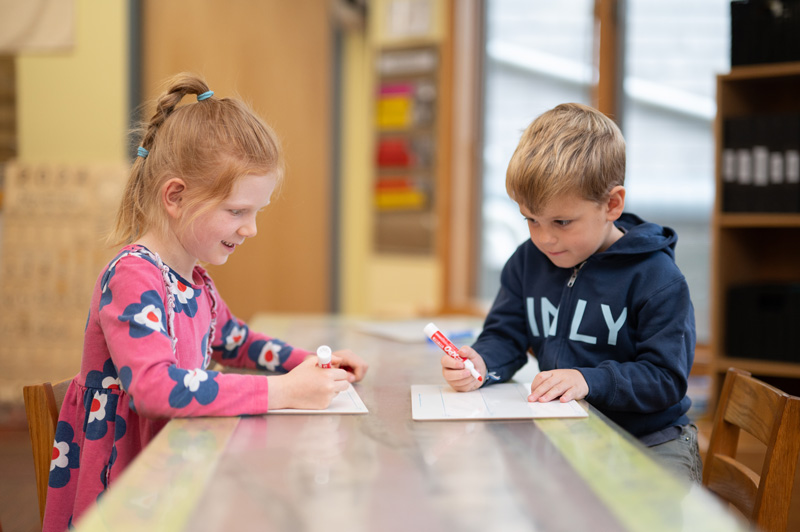Montessori +
Early Childhood | 18 months–K
Our Montessori-based 18 months - Kindergarten curriculum supports the physical, cognitive, social and emotional development of each child. Children explore themselves, their family and the world in which they live.
The program exposes children to each area of Inly's Montessori curriculum. They develop a variety of skills including concentration, coordination, language, self-regulation, responsibility and respect, all of which prepare them well for a successful transition into our Elementary years.
- Children aged 18 months – 3 years learn in our Toddler House.
- Children in PreK and Kindergarten learn in our Children’s House.
Toddler House (ages 18 months–3 years)
Toddlers are natural explorers, showing interest in everything in their environment and investigating every small detail. Our toddler classrooms are designed with this in mind, equipped with inviting sensorial materials that satisfy the natural desire for order and “doing it myself”.
Supported by nurturing staff in a student-to-teacher ratio of 7:1, your child builds independence in a loving “home away from home”.

Toddler House Program Hours
- 2-day (Monday and Wednesday / Tuesday and Thursday), 3-day (Monday, Wednesday, Friday), or 5-day (Monday–Friday) options
- Half-day (8:30–11:30 AM) or Full-day (Monday–Thursday 8:30 AM–3:30 PM; Friday 8:30–11:30 AM)
- Extended Hours are available (7:00 AM–6:00 PM, Fridays until 5:00 PM)
- Option for a year-round (12-month) enrollment
Toddler House Curriculum
The Practical Life curriculum is the cornerstone of the Montessori method. Practical Life exercises contribute to the development of motor skills whilst helping the child become independent.
Children learn physical skills, such as how to care for themselves (dressing, grooming, simple food preparation), how to care for their environment (including basic chores!), and grace and courtesy as modelled by their teachers.
Children are learning language long before entering the Montessori classroom. We reinforce the importance of verbal communication and speaking clearly, and support the child's expanding vocabulary. Even written language is explored at this early stage, with adults reading aloud to the children during story time.
Sensorial lessons stimulate, educate and refine the child's senses. We explore various practical activities with a particular focus on the environment around us, and take full advantage of our campus to explore senses outdoors.
Children explore different instruments and the sounds they make, feel and match different fabrics, smell the herbs from our garden, and taste different foods at snack time.
Maria Montessori believed that a child's mind is mathematical. We make exploring numbers enjoyable through songs, games and relating to time in real life (periods of the day, seasons of the year).
Science is all around us. For young children, this transcribes into observing their physical world and making discoveries. Children explore gravity, magnetism, sinking/floating objects, water property, plant/animal care and participate in nature walks.
Inly presents a school-wide, three-year rotation of content so special events can be thematically planned for the whole school. Each year, a central question is posed and each level has its own sub-questions that focus the lessons and studies.
Year One: Ancient Civilizations
The school-wide central question is: "How and why were ancient civilizations created?"
- The Toddler House focus is: "Where do we come from?", "Why do we tell stories?" and "Is every story about me?"
Year Two: American Civilization
The school-wide central question is: "How and why has American civilization changed?
- The Toddler House focus is: "How have I changed?", "What is family?", "What did my grandparents do when they were children?" and "What does peace feel like?"
Year Three: World Civilizations
The school-wide central question is "How and why do world civilizations connect?"
- The Toddler House focus is: "Who am I?", "How am I the same or different from others?", "How many people are in the world?" and "What do they look like?"
The World Language program exposes young students to a second language. Through games, songs and movement in small groups led by their Spanish teacher, children learn vocabulary.
Our Visual Arts program fosters creativity, problem-solving and self-expression. Emphasis is placed on the artistic process rather than the product.
Toddlers learn repetitive songs, echo songs and singing in unison. In addition, there are numerous opportunities to build community through performances, field trips and assemblies.
Toddlers have their own library in their classroom, which teachers change weekly with thematic ideas and seasons. Story time is an integral part of the daily experience at this level.
In keeping with Inly’s holistic mission, the Movement Arts program guides all children along the path to lifetime physical fitness, benefiting children's health, longevity, positive body image, improved overall self-esteem. This journey also leads to increased energy and concentration in all areas.
Preschool and Kindergarten students learn locomotor and axial movement activities, manipulative skills with movement props and creative self-expression through movement.

Children’s House (Preschool & Kindergarten | Ages 3–6)
Your child’s imagination, creativity and curiosity come alive in the Children’s House classroom. Learners discover, question and problem-solve as they explore a rich and wide-ranging curriculum.
Your child is taught how to complete tasks and work at their own pace, either independently, or in small or large groups with a teacher’s guidance. The Children’s House has a student/teacher ratio of 12:1.
Children’s House Program Hours
- Preschool: Monday–Friday, Half-day (8:30 AM–11:30 AM) or Full-day (Monday–Thursday 8:30 AM–3:30 PM; Friday 8:30–11:30 AM)
- Kindergarten: Monday–Thursday 8:30 AM–3:30 PM and Fridays 8:30–11:30 AM
- Extended Hours are available (7:00 AM–6:00 PM, Fridays until 5:00 PM)
The benefits of Kindergarten at InlyDownload our Kindergarten FAQs Inly’s full-day Kindergarten program, combines rich experiences of learning, development and discovery. Inly Kindergarteners thrive with a remarkable sense of ownership and responsibility for themselves, their community and their environment. Every moment in Inly’s Kindergarten brings something new: fine-motor skills and concentration are deepened through hands-on work, math concepts are mastered, handwriting is honed, and reading skills are nurtured, all taking place in a mixture of one-on-one lessons, small-group lessons and independent work.
A Day in the Kindergarten
|
Children’s House Curriculum
In keeping with Inly’s holistic mission, the Movement Arts program guides all children along the path to lifetime physical fitness. This journey benefits children’s health, longevity, positive body image, improved overall self-esteem and increased energy and concentration in all areas. At the toddler level, students discover that movement is fun by rolling, jumping, bending and stretching.
Three- four- and five-year olds are capable of so many things, and they are delighted to help and master new skills. Practical life activities like sweeping the floor, preparing snacks, or arranging flowers help your child develop order, concentration, coordination, and independence, preparing them for subsequent work in math and language.
Students prepare themselves for language study by working in the practical life and sensorial areas with materials that refine auditory, oral, visual and sensory/motor skills which are necessary for writing and reading in the third year. Language spans every other area as an integrated source of preparation for a well-planned approach to further learning. Kindergarten students (and those younger students who are ready) are introduced to “Learning Without Tears,” the Lucy Calkins writing program, and Orton Gillingham principles to extend our teaching of reading.
The aim of the Math curriculum at the Children’s House level is to help students develop their thought processes, not to simply teach math facts at an early age. With hands-on materials, students begin to understand concrete principles such as counting, place value, and the four operations (addition, subtraction, multiplication, division), which prepares them for abstract study at the elementary level.
Young children interact with the natural world everywhere they go. During this sensitive period, curiosity is nurtured and children are encouraged to explore their environment with their senses. Regular trips to our Outdoor Classroom, digging in garden beds atop Sunflower Hill, and walks around campus all afford rich opportunities. Once their senses have been awakened, they are shown more abstract concepts back in the classroom such as how to care for plants, how to feed and water the class pet, the different shapes found in leaves, or the parts of a butterfly.
Inly presents a school-wide, three-year rotation of content so special events such as cultural festivals, assemblies, field trips, and reading lists can be thematically planned for the whole school. Each year, a central question is posed and each level has its own sub-questions that focus the lessons and studies.
Year one—Ancient civilizations
- The school-wide question is “How and why were ancient civilizations created?”
- The Children’s House focus is “What is ancient?” “What is a civilization?” and “What is a story?”
Year two—American civilization
- The school-wide question is “How and why has American civilization changed?”
- The Children’s House is “How did America begin?” “What people shaped America?” and “Where did they come from?”
Year three—World civilizations
- The school-wide question is “How and why do world civilizations connect?”
- The Children’s House focus is “What do all people need to survive?” “How are people around the world the same or different?” and “What is peace?”
The Spanish program is designed to enable students to speak and write their basic thoughts and questions in a second language. The curriculum utilizes a combination of speaking, writing, and activities that are often based on music, art or physical response. Students learn vocabulary, numbers, games and songs in a second language environment that promotes confidence and creativity.
Preschool and kindergarten students visit the da Vinci Studio to develop basic problem-solving skills with hands-on creating. They also begin to learn how to use maker space tools safely.
Kindergarteners explore line, shape and texture with a variety of artist studies and seasonally-themed projects. They are also introduced to primary and secondary colors, value, balance, proportion and perspective to prepare them for more in-depth lessons in the elementary level.
Our Music program appeals to a variety of learning styles. Students begin to understand tempo and pitch and learn how to keep a steady beat and sing in unison. Kindergarten students learn aspects of drama in preparation for their musical. In addition, there are numerous opportunities to build community through performances, field trips and assemblies.
All Children's House students visit the Inly library on a twice monthly basis. They select books to bring home and enjoy stories read to them by a parent volunteer or the librarian.
Skills fostered include: how to treat a book properly, understanding the roles of the author and the illustrator, grace and courtesy in the library, knowing the location of various types of books, the role of the librarian, and taking responsibility for returning library books.
Children's House students are exposed to the computer in their classrooms and begin to understand its function. They hear their teachers identify the most basic parts of the computer. The students may choose to use a simple program and print a page of their work, but there is no formal requirement for computer skills at this level.
Inly weaves DEIJ principles into our curriculum to align with four core goals of anti-bias education—identity, diversity, justice and activism. Learn about our approach here.
